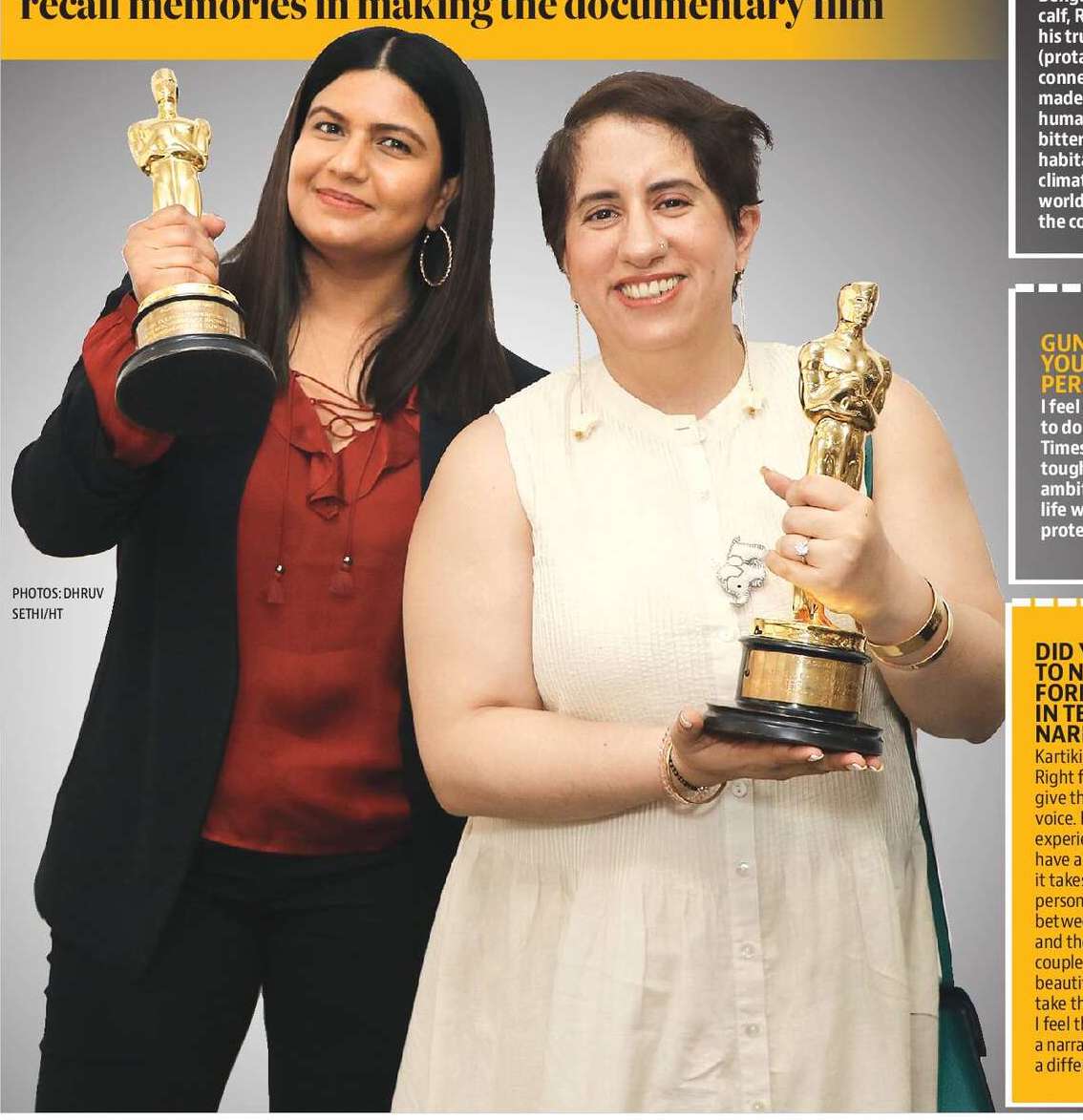In my 16 years of filmmaking, I had never seen this kind of fan art-Guneet Monga
8:35 AM
Posted by Fenil Seta

In a visit to HT City, producer Guneet Monga and director Kartiki Gonsalves talk about their historic win at the 95th Academy Awards and recall memories in making the documentary film
Compiled by Sugandha Rawal (HINDUSTAN TIMES; April 1, 2023)
Tell us a bit about the process of green-lighting a story or a script?
Guneet: It is intuitive, but producing is an art. The process is not everyone’s cup of tea and is extremely underrated. In our country, producing is seen as somebody putting in the money. Before taking up any project, I have a conversation with myself about what it is that we are bringing to light and if there is some innovation in it. Though a film is the director’s brainchild, we are holding the light for the director and making sure that this journey is as smooth and beautiful as possible.
The documentary, about the bond between a couple and an orphaned elephant calf, has won an Oscar. How did the journey start?
Kartiki: While I was driving back from Ooty to Bengaluru, I spotted a three-month-old elephant calf, Raghu. The calf was walking by the road with his trunk wrapped around Bomman’s (protagonist’s) arms. It came across as a beautiful connection between a human and an elephant. It made me think, why is this elephant calf with a human being? That’s when I got to know the bittersweet reality of Asian elephants losing their habitat at a rapid pace due to encroachment and climate change... I wanted to put that out in the world, through the story of a sacred bond between the couple (Bomman and Bellie) and an elephant.
What were the challenges you faced while working on the documentary?
Kartiki: Observing animals in an ecosystem is a challenge because you never know what will happen next. It requires a lot of patience. Plus, the [way towards the] Nilgiris was shut due to Covid, as the officials wanted to protect the 20 indigenous communities. On top of it, I got a bad bout of Covid-19. We got worried if there is a chance of elephants getting the infection. These were some of the challenges. However, the biggest challenge was disconnecting from your human emotions. When Raghu (the elephant) was taken away, the entire crew was in tears, however, we couldn’t do anything but record.
At what point after the release of the documentary did you realize that it was being appreciated from all quarters?
Guneet: The love showered [on the documentary] has been beautiful. The OTT platform (Netflix) on which the documentary came on has a wide reach. It is like putting a hoarding on the moon. After the launch [of the documentary], the first love came through fan art globally. In my 16 years of filmmaking, I had never seen this kind of fan art. Kids started responding to it. One thing led to another and we went from strength to strength. It’s unprecedented what happened. We were shortlisted and in March, we won the Oscars. It has been a very beautiful journey.
Did you consciously decide not to go into the usual formats of a documentary in terms of having a narration?
Kartiki: It was a very easy decision to make. Right from the beginning, I wanted to give the indigenous people a voice. From all my past experiences, when you have a narrator come in, it takes away from the personal bond between the couple and the viewers. The couple had so many beautiful messages to take the story forward. I feel that when there is a narrator, there is always a different interpretation.
Do you think the Indian audience still relies on receiving validation from the West?
Guneet: The Elephant Whisperers (2022) won Best Documentary Short film — a first for an Indian production. Besides this, I was also the executive producer of Period. End of Sentence. (2018) which had won an award in the Documentary Short Subject category at the 91st Academy Awards. An Oscar is definitely the biggest award in the world in our industry. Now, it happens to be in the West and we can’t do anything about it. It is because of the Oscars that we are going places. It is a celebration of filmmaking.
Guneet, you have had a tough childhood. How do you think those experiences shaped you as the person you are today?
I feel everything adds up in life. Whenever I talk to young people, I tell them to do as many internships as possible. My first internship was with Hindustan Times here in Delhi. It gives you exposure and confidence. My childhood was tough, but full of dreams. My parents were beautiful and gave me hope and ambition. They made me a fierce and an independent person. In my world, my life was beautiful despite all the chaos, property feuds and fights. My parents protected me from it and let me dream. And such exposures continue to help me.
This entry was posted on October 4, 2009 at 12:14 pm, and is filed under
95th Academy Awards,
Delhi,
Guneet Monga,
Guneet Monga interview,
Interviews,
Kartiki Gonsalves,
Kartiki Gonsalves interview,
Netflix,
The Elephant Whisperers
. Follow any responses to this post through RSS. You can leave a response, or trackback from your own site.
Subscribe to:
Post Comments (Atom)
Post a Comment